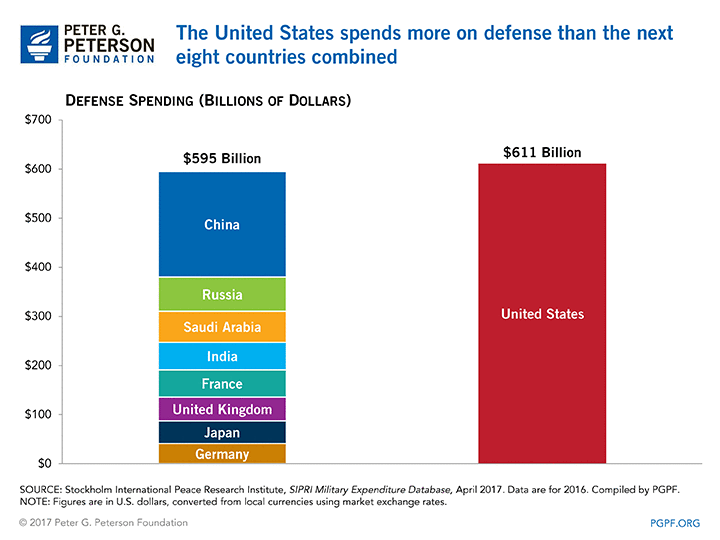Is the Military Really "Depleted" After Years of Record-High Spending?
No, not at all. But for military hawks, more isn't just always better, it's the only way to be patriotic.
Last week at the Conservative Political Action Conference (CPAC), Donald Trump said he would seek a "historic" spending increase to replenish our "depleted" military. And as Ed Krayewski notes below, the president will likely tonight officially announce a call for a $54 billion hike, which will be paid for by cuts to other parts of what's known as the "discretionary budget."
The response from at least one fellow Republican, former GOP presidential candidate John McCain? Not enough.
"In other words, President Trump intends to submit a defense budget that is a mere 3 percent above President Obama's defense budget, which has left our military underfunded, undersized, and unready to confront threats to our national security," McCain said.
There's little doubt that the military is exhausted. Since 2001, we've been waging endless wars, including in countries against whom we've never officially declared war. We're still in Afghanistan and Iraq, of course, and all signs point to boots on the ground in Syria sooner or later. War footing isn't simply expensive (even if we're spending less on "overseas contigency operations" that we did in the mid-Aughts), it introduces incredible strain and stress throughout the military and society at home.
But depleted, underfunded, undersized, unready? Please. Defense spending ratcheted up during the Bush years in the aftermath of the 9/11 attacks, the invasion of Afghanistan, and the war in Iraq. It hasn't come close to coming back down. In a nation that has supposedly wound down two of its longest wars and where the principal threat to the homeland is a group of religious extremists who live thousands of miles away (and are, lest we forget, a byproduct of our own failed occupation of the Middle East), we always need more money for defense, right?
Here are some charts that show various ways to think about trends in military spending. First is defense spending between fiscal 2000 and 2016 in nominal dollars:
Here is the same period but using inflation-adjusted dollars (2009 is the base year):
Here is a chart comparing U.S. defense spending to that of the rest of the world:

Give or take, the United States spends somewhere between $550 billion and $600 billion a year on defense. Hawks will tell you that we need to spend this or that amount of GDP (usually at least 4 percent, sometimes as high as 10 percent) on defense, which is self-evidently ridiculous.
Defense spending isn't something that scales up or down depending on the size of the economy (or even the number of people in the United States), so the idea that any sort of automatic formula makes sense doesn't pass the laugh test. Do our "enemies"—a loose-enough term to cover by ISIS and, say, North Korea, China, Russia, and Mexican immigrants—get smarter or more devious over time? Probably, but why that would require more money instead of more ingenuity on our part is unclear.
Republicans especially like to go on and on about government waste, fraud, and abuse, but they almost always exempt everything related to the military. That's despite ample evidence not simply of penny-ante stuff like Radar O'Reilly mailing a Jeep home one piece at a time from Korea but to mind-boggling boondoggles such as the F-35 program, which is producing planes that will be obsolete by the time they (maybe) are able to be deployed.
The Pentagon, like every other part of our bankrupt government and every family, business, and individual in this country, should be doing more with less. It should be streamlining and changing its operations, procurement systems, and everything else. This isn't a knock on the men and the women who defend the country, but there's no doubt that political leadership and military brass alike should be held to the same account as the rest of us.
More to the point: The reason why the military is exhauasted—not depleted or underfunded or undersized—is because our leaders in both parties have been asking too much of it for too long. It's not isolationist to say the U.S. military is in too many places and trying to do too many things; it's common sense. We want an army, navy, and air force that can keep us safe at home and defend our people and property abroad. The idea that $550 billion or $600 billion isn't enough to cover that tab is not simply ridiculous but borders on the insane. And the reality that spending that much for the past decade or more hasn't made the world a better place can be seen in the smoldering ruins of every place we've been occupying for most of the 21st century.
From 2012, here are "3 Reasons Why Conservatives—and all Other Red-Blooded Americans—Should Cut Spending Now":


Show Comments (83)